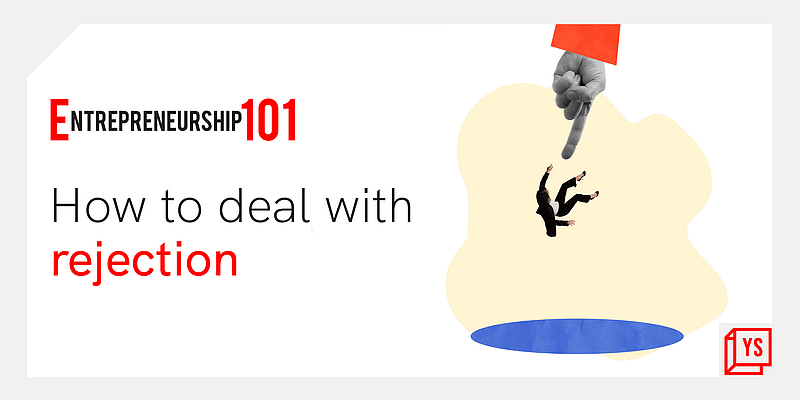“Why do we fall, sir? So that we can learn to pick ourselves up.”
This famous quote from Christopher Nolan’s movie Batman Begins signifies how, when one fails at something, they must learn to pick themselves up and never stop trying. This holds true for entrepreneurs as well.
The journey of a startup founder comprises many rejections before the ultimate success or acceptance of their idea. This includes criticism from peers, rejections from clients, and passing off a deal from investors.
A report by IBM Institute for Business Value and Oxford Economics states that about 90 percent of startups fail within the first five years. However, rejections or failures, by no means, imply aborting one’s mission.
In an earlier interaction with YourStory, Naveen Tiwari, Founder and CEO, InMobi, the first unicorn of India, said, “Rejection is a thing you learn first in entrepreneurship. Nobody prepares you for rejections. The biggest thing about entrepreneurship is to deal with rejection on a constant basis and then still come out of it all right.”
In 2019, the entrepreneurial ecosystem was shocked when entrepreneur VG Siddhartha, the Founder of homegrown coffee chain Cafe Coffee Day (CCD), wrote a letter stating that he had “Failed as an entrepreneur,” and took his own life. Despite being a legendary and successful entrepreneur, Siddhartha’s death brought forth how obstructions during the growth-stage of a company can drain an entrepreneur, and how lonely it can get at the top.
Anna Chandy, psychologist and Chairperson of the Live Love Laugh Foundation, had told YourStory in an earlier conversation, “Nobody talks about the journey of failures and how it is normal. We need to start accounting for those as well in all the stories we write and talk about.”
With this in mind, for this article on Entrepreneurship 101, we dive deeper to understand what rejection means in an entrepreneur’s world and how founders from the Indian startup ecosystem deal with rejections.
Get used to rejection
Hospitality unicorn Oyo’s valuation stands at about $9 billion, and earlier YourStory reported that the startup was heading for an initial public offering (IPO). The company is backed by about 28 investors, including marquee investors like SoftBank, Lightspeed Ventures, Airbnb, Microsoft, Grab, and Sequoia, to name a few.
However, Oyo founder Ritesh Agarwal did not become the youngest billionaire of India at his first shot. Before reaching where he is today, Ritesh got rejected by nearly 80 percent of the VCs that he wrote to.
Early last year, the unicorn founder tweeted: “As an entrepreneur, you are going to face rejection most of the time, get used to it. But the few moments where people are willing to give you time are the ones that matter. Make the most of them.”
It is, therefore, inevitable to face rejection in the entrepreneurial journey. While you must get used to the idea of being rejected, do not let you pull you down or give up on your dreams.
Rejection is good for you
When facing criticism or rejection, entrepreneurs must remain objective and professional. More often than not, rejections will break your heart. However, do not let it get into your head. Instead, use rejection as an indicator to improve your existing idea.
This mentality has worked for edtech entrepreneurs Abhishek Patil and V Satish Kumar. The duo quit their high-paying jobs to start Oliveboard in 2012. After two-years of failed attempts at trying to make the startup work and raise funds, Abhishek and Satish were on the verge of giving up when they decided to give it one last shot.
This, after facing 70 rejections from potential investors.
Image Credit: Shutterstock
In an earlier conversation with YourStory, Abhishek said, “We got plenty of negative feedback on how we will not be successful, and why we needed to shift to be a coaching centre rather than just an online platform, or rather a service provider.”
These rejections made the entrepreneurs realise that MBA and TOEFL (Test Of English As A Foreign Language) coaching were not their cup of tea. It was then that Oliveboard ventured into Campus Recruitment Training. Within a day, four colleges partnered with Oliveborad to train students for the aptitude exam and written technical exam. Within a month of trying harder, the startup got a runaway for up to 15-months. Later in 2016, Oliveboard managed to raise funds worth Rs 2.8 crore from the Michael and Susan Dell Foundation.
Therefore, rejections are crucial – you may either allow them to break you, or work on them to realise your dreams.
Believe in your idea
Rejections often seem like the deal breaker when coming from an important stakeholder or investor in the company. If you remain true to your intentions and continue moving forward in the right direction, you are sure to achieve success. And if you strongly feel for an idea and believe in your efforts, do not let rejections demotivate you.
When Gurugram-based healthtech startup MyHealthCare Technologies started out in 2018, the founders approached several hospitals with their product vision. The startup wanted to be the technology partner to hospitals, diagnostic labs and health clinics, and provide them patient facing services and improve patient care.
However, at that time, hospitals opposed their idea of using virtual consults and digital health solutions for their patients. “They (hospitals) felt that doctors would not be able to make the right diagnosis over a virtual call and were skeptical about using technology,” Divya Loroiya, Co-founder and Chief Product Officer of MyHealthCare tells YourStory.
Image credit: Aditya Ranade
Later, when the pandemic hit the world, the mindsets changed. Doctors had no option but to treat patients through virtual consults. With the onset of COVID-19, MyHealthCare was facilitating about 800 virtual consultations a day. In April last year, the number grew to 2,500 consultations a day.
Divya revealed that today the startup works with 94 leading hospitals and over 65 clinics across the country, managing about 24 million patients. She says, “We learnt with time that there were important learnings hidden in the criticism and that if we looked at it objectively, it could add value to our product. Since we were clear about our vision of improving healthcare delivery and providing data-driven care to patients, we were careful to not allow the criticisms and rejections derail us from our goal.”
Advice from experts
YourStory asked established entrepreneurs what their advice for aspiring startups would be, with respect to dealing with rejection. Here’s what they had to say:
- “Before starting out, you should always be sure of your vision and then work passionately towards that. No matter who criticises you, it should not affect your end goal” – Divya Loroiya, Co-founder and Chief Product Officer of MyHealthCare Technologies.
- “Don’t overthink it, but be open to learning” – Krishna Tamalia Vora, Founder of Mom’s Therapy.
- “Do not take rejection personally and try rising about it. Only a rejection can prepare you for another” – Kamakshi Agarwala, Founder of Butt-Chique.
Therefore, it is essential to take a pause when you face rejection. Take a step back to analyse the situation and give yourself the liberty to try again. Once you have figured out the solution, get back up on your feet and chase your dreams like it’s only the right thing to do.
Three-years after Siddhartha’s passing away, the current CEO of CCD, and wife of Siddhartha, Malavika Hegde continues to run the empire that her husband built. Under Malavika’s leadership, CCD has brought down its debt from Rs 7,200 crore to Rs 1,731 crore within two-years. Malavika sets an example for all the entrepreneurs out there, showcasing immense grace in the face of adversity.










![Read more about the article [Funding alert] Mindtickle turns unicorn with $1.2B valuation after $100M round led by SoftBank Vision Fund 2](https://blog.digitalsevaa.com/wp-content/uploads/2021/08/mindtickpleP-1605506245681-300x150.png)